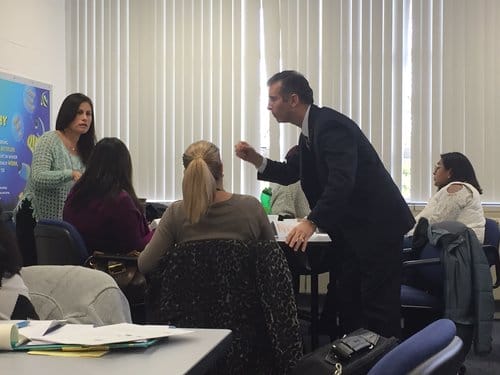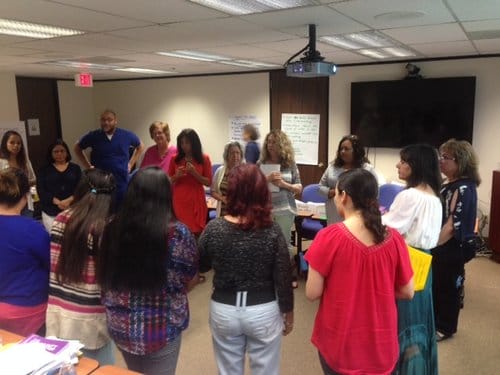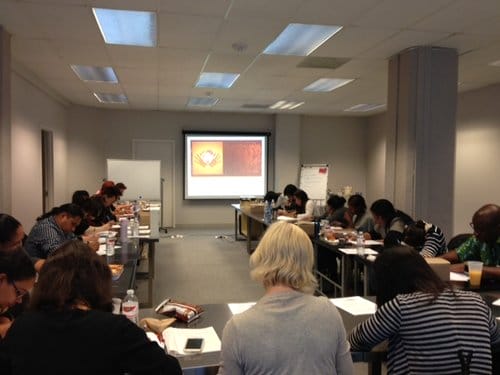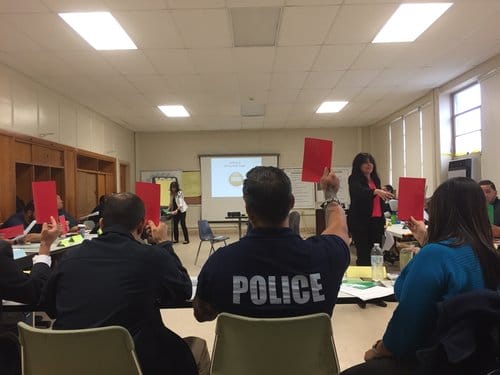We proudly serve a diverse range of government agencies, including federal, state, and local agencies, as well as nonprofits who help deliver social services. Our clients, such as the U.S. Air Force, local health departments, court systems, and police departments, benefit from our industry-leading expertise, specialized training programs, and comprehensive consulting services.
Our training helps government agencies reduce disparities and connect with increasingly diverse populations. In critical services such as healthcare, social assistance programs, and law enforcement, clear communication is essential for ensuring individuals’ well-being and their access to vital resources and support.
Misunderstandings due to language barriers can lead to critical mistakes, costly errors, service delays, legal challenges, and a loss of public trust. CCC helps agencies better serve multi-cultural populations and comply with local, state, and federal laws like Title VI of the Civil Rights Act that require equitable access for individuals with limited English proficiency.
Ultimately, investing in culturally and linguistically appropriate services increases the efficiency and effectiveness of government operations, reduces legal risks, and strengthens community safety and trust.
Qualified staff interpreters ensure accurate & ethical communication in high-stakes situations, reducing errors, improving outcomes, and maintaining compliance across government, medical, legal, and community settings.
Reduce reliance on external resources and build an internal team of qualified instructors capable of delivering ongoing language and cultural training.
Address the full spectrum of language access needs, including interpreter training, multilingual resources, communication policies and procedures, compliance strategies, and more.
Receive expert guidance on best practices, online training solutions, remote interpreting, cultural mediation, and more, as you implement and refine language access and cultural competence solutions across your organization.
We’re on a mission to empower organizations to provide equitable and high-quality services to all, regardless of language or cultural background. We serve clients across sectors — local to international, private to public, nonprofit to for-profit — ensuring your services meet the highest standards.
We offer online, on-site, and interactive workshops that can be customized to fit the needs of your staff or volunteers. Build your own training program for maximum convenience, or access our existing courses through licensing agreements for ongoing staff development.
As pioneers in language access solutions, we provide consulting, technical assistance, and ongoing support to help organizations improve service delivery, implement best practices, ensure compliance, and more. Whether you’re starting from scratch or improving existing operations, we can be your guide.
Our signature Cultural Competence training is fun, simple, and EFFECTIVE. Grounded in national standards and best practices, it equips service providers, frontline staff, and interpreters with practical tools to navigate cultural and linguistic diversity. We also offer Training of Trainers so your staff can sustain this vital work from within.
We develop curricula for a variety of needs, including staff or volunteer training programs, Train-the-Trainer programs, conference workshops, and more. We create programs that equip your team with the skills and knowledge they need to effectively serve diverse populations.

CCC designed and delivered a Simultaneous Interpreting Workshop for the district’s bilingual staff, focusing on key skills needed for effective simultaneous interpretation in educational settings. The one-day workshop helped 25 staff members:
CCC delivered our Cultural Competence Training—four live, two-hour online language access sessions—to approximately 100 City of San José staff. Customizing the program to meet the unique needs of the City of San José, we focused on national standards for culturally and linguistically appropriate services (CLAS), Title VI of the Civil Rights Act, and best practices for serving diverse populations.
Most recently, we customized and delivered the LACR program to members of the San José Police Department, training officers to effectively communicate with and serve culturally and linguistically diverse communities. The training addressed language and communication barriers to better serve both native-born and immigrant residents.

CCC delivered a three-day Cultural Competence in Health and Human Services-Training of Trainers (TOT) program, training 25 interpreter trainers to deliver the curriculum to others. This included providing them with licensing materials, PowerPoint kits, and instructional guides, enabling the department to expand its capacity to deliver cultural competence training statewide.
In 2024, we designed and delivered four one-day Introduction to Community Interpreting workshops for bilingual county staff. Each session, with up to 25 participants, equipped staff with foundational interpreting skills and instructional materials to better serve the county’s multilingual communities.
CCC has delivered annual Trauma-informed Interpreter workshops for up to 25 interpreters each year. The workshop focused on interpreting effectively for survivors of domestic violence and sexual assault, training interpreters in trauma-informed techniques to avoid retraumatization and support survivor autonomy. Participants also developed personalized self-care plans to support their long-term wellness.

Since 2014, CCC has delivered a range of training sessions for OCEIA, including a 40-hour certificate program for interpreters and bilingual staff to perform professional interpreting in educational settings. Additionally, we’ve conducted 12 half-day Language Access Training sessions, equipping city employees with the skills to effectively communicate with individuals with limited English proficiency in both written and live interactions.
CCC delivered multiple workshops to support the work of interpreters in cases of domestic violence and abuse, including “The Trauma-informed Interpreter” and “Working Effectively with Interpreters in Domestic Violence and Abuse Cases.” These programs equipped court interpreters with trauma-informed techniques and strategies to support survivors, while also focusing on the self-care of interpreters working in high-stress environments.

CCC delivered the “Introduction to Legal Interpreting for Bilingual Officers” workshop, equipping bilingual officers with the essential skills to interpret accurately and professionally in legal contexts. This training ensures officers can effectively communicate with both English and non-English speaking community members, fostering respect and accuracy in their professional interactions.
CCC delivered the “Trauma-Informed Interpreter” workshop, specifically designed for interpreters and court reporters. This training focused on handling cases involving trauma survivors with compassion and professionalism. Participants learned key techniques for providing sensitive, accurate interpretations while supporting victims’ emotional needs. The workshop also addressed the emotional toll these cases can have on professionals, providing strategies for self-care and maintaining professional integrity during challenging situations.
Intersect is our weekly e-newsletter with breaking news on language, culture and interpreting. Join 20,000+ subscribers in over 100 countries!